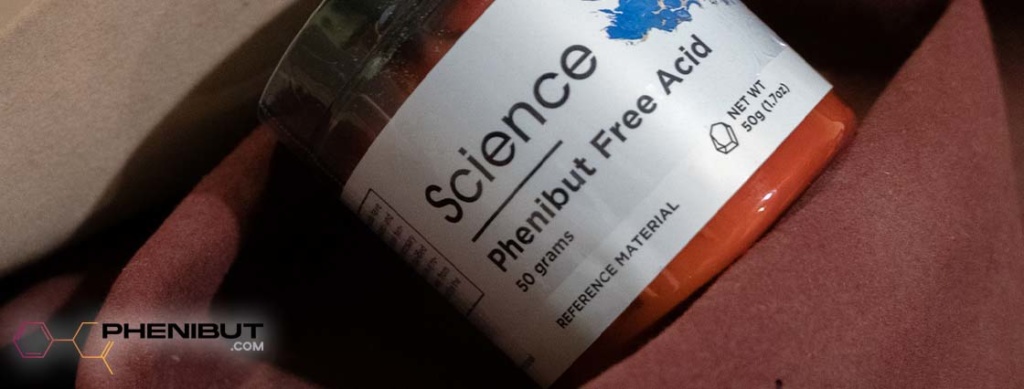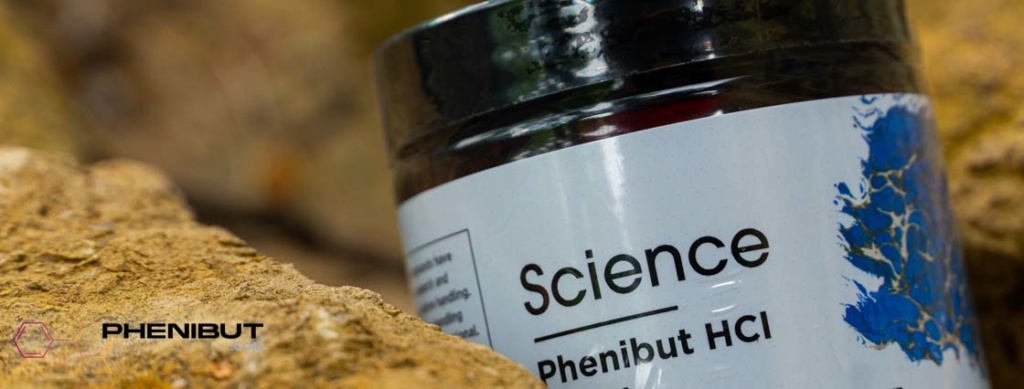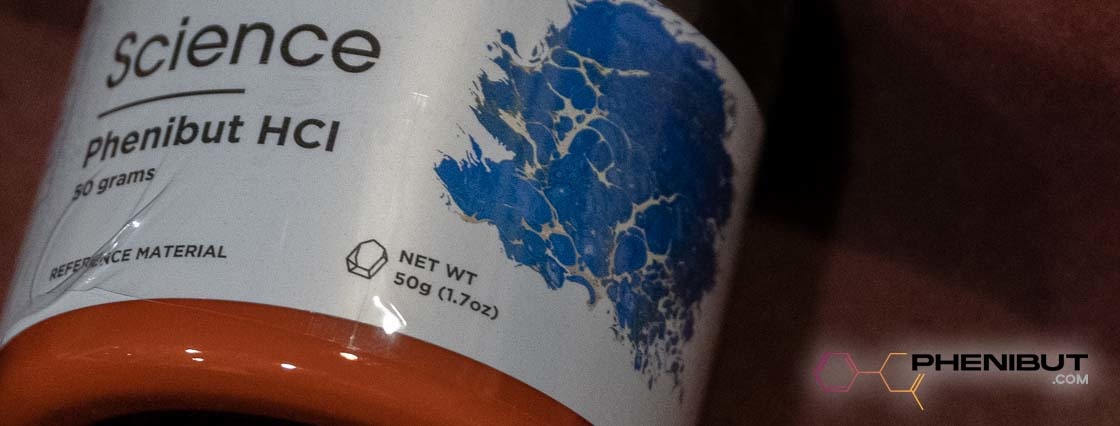This guide examines the current knowledge on phenibut for public speaking anxiety, including whether it has been used to this end. There is strong evidence that public speaking disorder is a subtype of social anxiety disorder (SAD) and is highly prevalent among the general population. This raises the possibility that anxiolytic compounds such as phenibut may be an effective line of treatment.
Researchers will find a complete overview of phenibut including its benefits, side effects, and potential as a treatment for public speaking disorder. We will also look at dosing protocols before suggesting a phenibut vendor for researchers interested in procuring this research chemical online.
Order Phenibut online from the best vendor in the world!
Great prices, quick shipping, and guaranteed delivery.
Disclaimer: Phenibut.com contains information about products that are intended for laboratory and research use only, unless otherwise explicitly stated. This information, including any referenced scientific or clinical research, is made available for educational purposes only. Phenibut.com makes every effort to ensure that any information it shares complies with national and international standards for clinical trial information and is committed to the timely disclosure of the design and results of all interventional clinical studies for innovative treatments publicly available or that may be made available. However, research is not considered conclusive. Phenibut.com makes no claims that any products referenced can cure, treat or prevent any conditions, including any conditions referenced on its website or in print materials.
What is Phenibut?
Phenibut is the name for 3-phenyl-4-aminobutyric acid, a drug with well-documented nootropic and anxiolytic effects. In the majority of the world, phenibut is available as a research chemical and has no officially approved medical use. In a select few countries, namely Australia, Hungary, Italy, and France, phenibut is classified as a controlled substance [1, 2, 3, 4].
As a prescription drug, phenibut is most commonly manufactured, sold, and used in Russia, but it is also marketed in Kazakhstan, Ukraine, Latvia, and Belarus under a number brand names such as Noofen. In these countries, phenibut is most commonly produced in 250mg tablets [5], but elsewhere phenibut is sold in powder form or as a solution [5].
Phenibut Benefits
As phenibut’s medical use is limited to just five countries, comparatively little is known about its benefits. The primary sources of information are Instructions for Use (“IFU”) documents produced by Russian drug manufacturers. One such document, published by drug manufacturer Ozon in the Russian language, states that phenibut can be used to [5]:
- Reduce anxiety and tension
- Reduce irritability
- Reduce the frequency and severity of headaches
- Enhance brain function (i.e. memory, attention, and speed)
- Enhance physical performance
Phenibut is indicated to treat the following conditions in adult patients [5, 6, 7, 8]:
- Anxious-neurotic states
- Anxiety spectrum disorders
- Chronic cerebral ischemia (CCI)
- Protracted anxiety-phobic disorders
- Insomnia
- Asthenia
- Meniere's disease
- Motion sickness
- Symptoms associated with alcohol withdrawal
In the following section, we will examine the main side effects and safety issues associated with phenibut use.

Phenibut Side Effects and Safety
According to the above-cited IFU produced by Ozon, phenibut cannot be prescribed to children under three, or to patients with gastrointestinal or renal impairment, hypersensitivity, or those who are pregnant or breastfeeding. It can cause the following side effects in adult patients [5]:
- Agitation
- Irritability
- Allergic reactions
- Dizziness
- Drowsiness
- Increased anxiety
- Headaches
- Nausea
Phenibut is typically prescribed in short courses lasting two or three weeks and the standard daily dose for anxiety disorders is 250-500mg, three times per day. However, extended phenibut use or cases where the dosage exceeds seven grams per day can cause [5]:
- Lower blood pressure
- Fatty degeneration of the liver
- Eosinophilia
- Impaired renal function
The IFU states that patients who are prescribed phenibut should avoid hazardous activities that require attention and must have their liver and blood function regularly checked [5].
Drawing on English-language sources, phenibut has been associated with a “rapid development of tolerance and dependence” [1] and may cause acute withdrawal symptoms [9, 10, 11]. U.S. researchers have linked phenibut to over 1,300 cases where phenibut use required hospitalization, including one death [12]. Cohen et al. noted that phenibut’s potential to cause lethargy, delirium, psychosis and coma has prompted the United States Food and Drug Administration to issue an advisory warning that phenibut should cease to be included in dietary supplements [13].
Phenibut for Public Speaking | The Basics
Researchers wishing to investigate the efficacy of phenibut for public speaking anxiety must start with a thorough understanding of this disorder as well as the basics for addressing it effectively. In this section, we will provide an overview of this condition and the current best practices for treatment.
What is public speaking anxiety?
Public speaking anxiety is believed to be a subtype of social anxiety disorder (SAD), and can affect (to varying degrees) anyone who has to speak in front of a group of people [14]. According to Panayiotou et al, public speaking anxiety can manifest in one or more of the following psychological and physiological symptoms [15]:
- Increased heartbeat
- Squeaky, shaky, or stuttering voice
- Shaking
- Sweating
- Dry mouth
- Butterflies in the stomach/feeling of nerves/sense of dread
An individual can experience public speaking anxiety to varying degrees, ranging from a sense of general unease all the way up to a sense of fear that leaves a person almost incapacitated and unable to speak.
How is public speaking anxiety treated?
While there is no way to completely eliminate or cure public speaking anxiety, there are a number of treatments available that can help individuals overcome their fear of speaking in front of others. According to a review of public-speaking anxiety treatments by Charles Pull, there is support for treating this disorder through online cognitive-behavioral self-help programs [14] and exposure to virtual environments (i.e. virtual reality therapy, or VRT) [16, 17].
Research has shown that these treatments have a high success rate in helping people overcome their fear of speaking in public [14].
Is phenibut indicated for public speaking anxiety?
In our review of the relevant literature, we did not identify any evidence that phenibut is a recognized treatment method for public speaking anxiety in any country, excepting the aforementioned five countries where phenibut is officially approved for use as an anxiolytic (Russia, Latvia, Kazakhstan, Belarus, and Ukraine). Phenibut is indicated in these countries to treat patients with anxious-neurotic conditions, and researchers have noted that it is widely used in Russia to treat patients with anxiety [6]. This strongly suggests that phenibut has potential to address public speaking anxiety.
As much of the clinical trial data associated with phenibut is published in Russian, translation issues hinder a full understanding. But it seems safe to infer that the “anxious-neurotic states” referred to in the Ozon IFU include anxiety disorders such as public speaking anxiety [5]. There are clear similarities between the excessive psychological and physiological reactivity shown by patients suffering from public speaking anxiety and the symptoms displayed by patients with other anxiety disorders. Further research in this area is clearly warranted.
World’s Best Drug for Public Speaking?
Researchers curious about whether phenibut is the world’s best drug for public speaking anxiety will note that the use of anxiolytic compounds to treat public speaking anxiety appears to be limited outside of countries where phenibut has a recognized medical use. After reviewing the current literature about public-speaking anxiety, the use of anxiolytic compounds is not considered a first-line treatment for this condition anywhere in the world. At the time of writing, VRT and cognitive-behavioral self-help courses are considered to be the latest treatments for this disorder [14].
There is, however, research showing that there are potential alternative treatments of public speaking anxiety. For instance, research by Bergamaschi et al. found that pretreatment with Cannabidiol (CBD), which also produces well-documented anxiolytic effects, can significantly reduce anxiety, cognitive impairment, and discomfort when administered to subjects with social phobia [18].
Which drugs are used to treat public speaking?
Research into the use of anxiolytic compounds to treat public speaking anxiety is limited and researchers interested in exploring pharmacological treatments for this disorder may note that current first-line treatments for stress-related disorders are selective serotonin reuptake inhibitors (SSRIs) like fluvoxamine (Kotova et al. [19]). This suggests that comparative studies into the efficacy of phenibut vs. fluvoxamine may be a promising direction for future research.
While phenibut is not approved as a prescription medication in the U.S. and remains a research chemical in most parts of the world [13], there is evidence that this drug is widely marketed online as beneficial for public speaking anxiety and that it may work where conventional interventions have failed. As noted by a delegate of the Australian Therapeutic Goods Administration, the prevalence with which phenibut is sought out is thought to be increasing [1]. Unverified claims that phenibut can help with anxiety disorders, including public speaking, are widespread.
Phenibut’s main effects are to increase cerebral blood flow, lower inhibitions, and soothe calm nerves, all of which are clearly helpful to people with a fear of speaking in public. Trials involving phenibut have found that it can help patients with anxiety-phobic disorders (APDs) [8], and this strongly suggests that it could be used as a public speaking anxiety treatment.
How to Use Phenibut Properly
In countries where phenibut is approved as a prescription medication and indicated to treat anxiety disorders, adult patients may be directed to take 250-500 mg of phenibut, three times per day [5]. According to Ozon’s IFU, patients should not consume more than 750 mg of phenibut in a single dose or exceed 2,500 mg/day.

Where to Buy Phenibut Online? | 2022 Guide
Researchers intent on exploring phenibut’s efficacy for treating public speaking anxiety may be curious about where to buy phenibut online in 2022. While there are multiple vendors who claim to ship this research chemical worldwide, finding a reliable source can be difficult.
To assist researchers, our team has reviewed a number of phenibut vendors and ranked them according to the quality of their phenibut, their shipping policy, refund policy, customer service, and prices.
The winner?
Science.bio
And here’s why:
- Third-Party Testing: Of all the vendors we tested, Science.bio is the only one that gets their phenibut tested by an independent third party. Science.bio has every batch of phenibut tested prior to listing it for sale and posts the lab report on their website. We were extremely impressed with this level of transparency and could not find any other vendor that matched Science.bio on this front.
- Attractive Prices: On bulk orders of 200+ vials, Science.bio offers a per-unit price of just $10.49 for 3,000 mg vial of phenibut. This drastically lowers the cost of researching with this compound.
- 100% Refunds and Reships: in the unlikely event that an order is lost or delayed, Science.bio offers a 100% refund or a free reshipment.
- Fast International Shipping: All orders over $100 to the U.S. ship free, while international orders can ship for as little as $15. This is one of the best-value shipping offers of any vendor we reviewed.
Researchers looking for a reliable source of research-grade phenibut are strongly encouraged to check out Science.bio. They offer 99%+ pure phenibut at reasonable prices and ship nootropic compounds worldwide within a reasonable time frame.
Overall, highly recommended!
Ready to order Phenibut from the top-rated online vendor?
Phenibut for Public Speaking | The Verdict
Researchers curious about studying phenibut for public speaking anxiety must note that while this compound may offer anxiolytic benefits, its side effects and safety profile are concerning. Care must be taken when administering phenibut to test subjects. This guide has highlighted several areas that warrant further study, including phenibut’s long-term safety and its effectiveness as a treatment for anxiety disorders compared with established first-line treatments like fluvoxamine and other SSRIs.
Researchers wishing to investigate phenibut further are advised to consider Science.bio for their research chemical needs.


